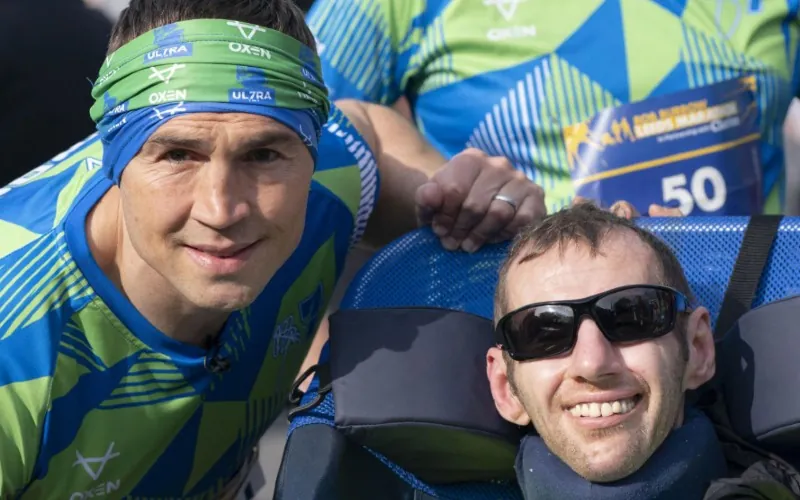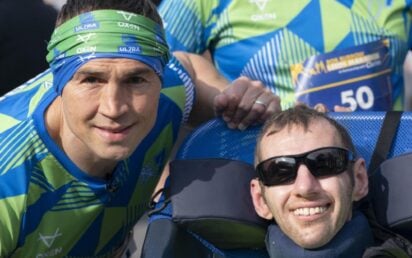This December, Kevin Sinfield will hit the streets again to raise money and awareness for those impacted by motor neurone disease.
The Leeds Rhinos and England Rugby League legend has already raised £10m from five previous challenges, following the diagnosis and tragic death of his former team-mate Rob Burrow.
The latest challenge is called ‘The 7 in 7: Together’ and will see the 44-year run seven ultra-marathons in seven days and is hoping to raise £777,777.
His fundraising exploits have made him a national hero but who is Kevin Sinfield and what makes him tick?
Sinfield was included in BusinessCloud’s 2024 Northern Leaders list and I interviewed him recently at a business breakfast on May 9th, 2025 in aid of Rochdale’s Springhill Hospice.
The first thing to say about Sinfield is his fundraising achievements are matched only by his modesty.
Leeds Rhinos’ website describes him ‘simply the greatest captain in the club’s history’ having led his team to seven Championships.
A one club man he made 521 appearances for Leeds, won 26 caps for England and 14 caps for Great Britain.
Post playing career he’s been a successful coach and is the co-founder of Be The Standard, a successful leadership development group that combines the elite aspects of sport and business.
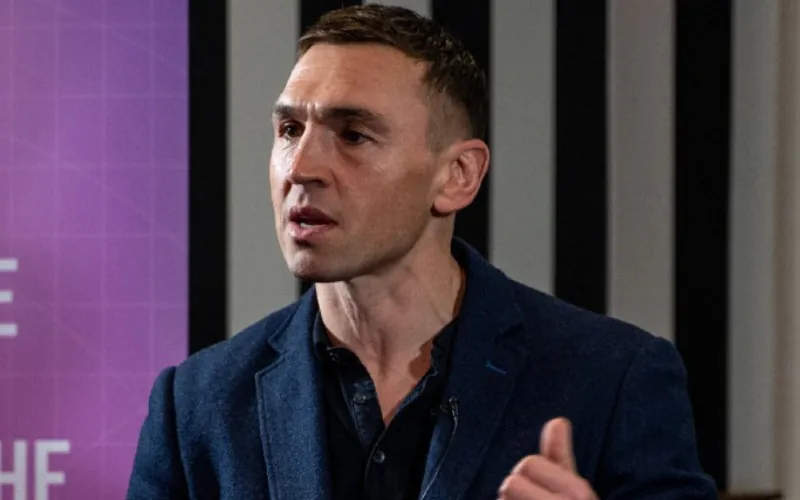
Kevin Sinfield, co-founder, Be The Standard
However, it’s his remarkable friendship with Rob Burrow and his superhuman fundraising exploits for MND that have catapulted him on the way to becoming a national treasure.
Sinfield shared his story earlier at a business breakfast at Rochdale Golf Club in aid of Springhill Hospice, where his brother-in-law Andrew had been cared for.
“When I retired at 35 and I look back at my rugby career, my rugby career was only there to prepare me for what we’ve done the last five years with the running for Rob, I truly believe that and didn’t realise at the time,” he explained.
“When you do your dream job and then you stop at 35 and you try and search for what’s next, it’s really, really hard to work out where you sit and what comes next.
“The tragedy that happened with Rob gave me someone to grab onto, gave me something to chase and I think the rugby career was there just to prepare me for what came next.”
Rob Burrow was only 37 when he was diagnosed with Motor Neurone Disease. He became a prominent figure in raising awareness for the disease and passed away in 2024, at the age of 41.
Sinfield had been 14 and Burrow 12 when their life-long friendship began at the start of their rugby league careers with Leeds.
“Anybody who knows Rob or remembers Rob, he was 5ft 4 and a quarter and he was tiny when he was 12,” he recalled. “He was just all nose and ears, as most of us are.
“He was so quick but he didn’t say a word. Back then, you walked into a dressing room as a young lad, you didn’t speak. It’s very, very different in dressing rooms now, because young lads are different, and that’s fine. Back then, you sat in a corner, you had your head down, and you only spoke when you’d spoken to because of the respect thing.
“It wasn’t until probably four or five years down the track that we started to feature in teams together, that we became good mates.
“He just came up with big moments for a little guy. I’m certainly not a giant and you’d probably look at me and think ‘how on earth did he survive?’ Rob was half the size of me and he didn’t just survive, he thrived.
“He tormented and ran rings around the big guys. He was that quick, but he was tough. He was so courageous, and the big lads lined him up, they’d run straight at him and because he was that small, he’d get underneath them and drop them on their back.
“He was tenacious, very, very skilful, but his body, pound for pound, is probably the strongest, fittest, the fastest we had in our team, because he was 68kg, which is nothing.”
Even during his playing career, Sinfield was planning for life after rugby.
“The reality of being a rugby league player is, at whatever age you’re fortunate to play to, you’re going have to get another job after, because it’s a great lifestyle and you’re paid well, but you’re not paid like your footballers,” he said.
“The reality is, for most players, at whatever age they retire, a lot of them end up on the tools, or they end up in all different sorts of industries.
“My Mum and Dad pretty much forced me to do my A-Levels, but I knew it was the right path and I knew I had to carry on that education as it was important for me.
“Post playing, I wanted the next block of my life to be about something more important than rugby.”
During his career he studied part-time at Leeds Beckett University, graduating in 2008 before adding a MA in Sport Business.
Sinfield said one of his life-defining moment was being dropped at the age of 19 for the 2000 Challenge Cup final at Murrayfield Stadium in Edinburgh.
”The semi final was live on BBC (and) I got man of the match,” he recalled. “I got a couple of tries the week after when we won at home convincingly and I got (another) man of the match.
“I played every game that year and we’re going to the final. A couple of days before we travelled to Edinburgh, the coach pulled me to one side and said: “You’re not playing.”
“My heart broke and I can remember driving home that day, and I don’t mind sharing that I shed a tear, I was proper gutted because this was the biggest thing in my life up to that point and now the biggest disaster. He said I wasn’t experienced enough.”
On the day of the game Sinfield found himself sitting in the stands feeling sorry for himself when Spandau Ballet singer Tony Hadley, who’d been providing the pre-match entertainment, sat next to him.
“He gave me a big elbow and I told him that I’ve just missed out on my dream,” recalled Sinfield. “He said: ‘Well, if you think that’s bad, the reason I’m here today is because my former band members are trying to sue me and next week, it’s very, very likely I’m going to be declared bankrupt. And to make it worse, my wife has left me’.
“I was 19 and I thought it was pretty bad for me but it wasn’t. I was worse for Tony Hadley. On that particular day, he sang Gold. Well, when you win in professional sport, you get a gold medal. So ever since that day, when I’m in a tough spot, I’ve got a bit of adversity, when I was in a horrible pre-season session, or when I was running and the MND stuff, when I get some bad news, you know, when I was in the hospice and stuff, I say gold to myself.
“It reminds me of two things. The first one is, I want to win. I’m not ashamed to say I want to win whatever I’m involved in. And also, when I say gold to myself, it reminds me that no matter how bad it is for me, it’s always worse for someone else. On that day it was Tony Hadley.
“I think if you’re willing, you can get inspiration from anyone you meet, it’s just whether you’re willing to spend enough time to listen and take it in.
“You’re often searching for a sign or something that will change something for you. Truth be known, you change it yourself. It’s all about your attitude towards things.
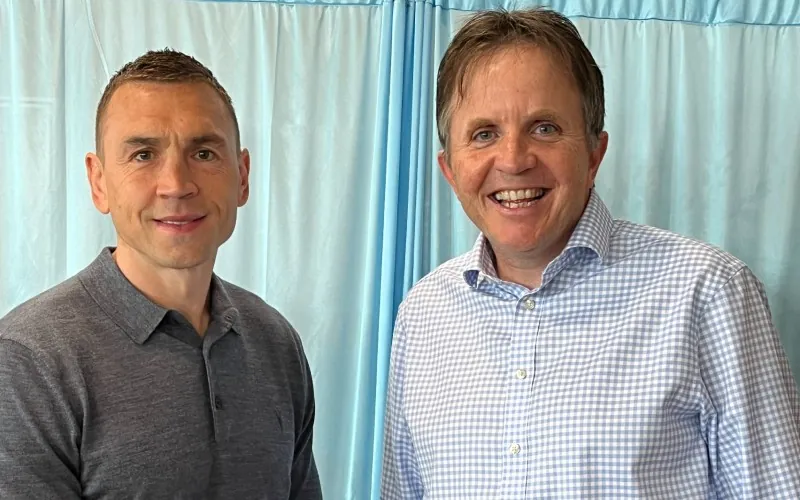
Kevin Sinfield with Chris Maguire at fundraising event for Springhill Hospice
“We all have bad news. We all have things that happen to us that we would love to change, but that’s life. Life is tough, right? And we can lie in bed and we can curl up and pull the covers over and we can hide away from it. But those who’ve been through tough moments realise, the sooner you get out of bed and front it and get after it and try and fix it, the better it is.”
Oldham-born Sinfield told the audience how he first became aware his friend Rob Burrow had a serious health problem at an awards evening in September 2019.
“I was Director of Rugby back at the Rhinos, a sporting director and Rob was our U19s,” he said.
“Rob got up at this awards evening to speak and present an award. He slurred his words. Rob didn’t drink much but as soon as he finished, I’m straight over to him because I’m his boss, but I’m also his mate, and I whisper in his ear, ‘have you been drinking?’ because we’re on club duty and he can’t be drinking at an event.
“I knew he wasn’t drinking, but I had to find out what was going on. And he looked disgusted at me, said ‘no’ and that then set off a series of tests.
“We sent him to the club doctor and told him to throw the kitchen sink at it. He then goes through a series of tests and everything is no, no, no, no, no. It’s (MND) the last thing that you can get diagnosed with, because they run out of ideas of what it can be.
“I remember meeting Rob at the start of December, and typically, Rob being 5ft 4 and a quarter, he always made himself bigger. He’d always have a hoodie, or he’d always be wrapped up.
“I remember meeting him on this particular day. I took his coat, he had a T-shirt, and his arms were moving. I mean, his skin was crawling.
“He was going for a test the following Monday, his final one, he’d been Googling his symptoms. His speech was bad, everything was moving underneath his skin, and he asked the specialist if he had MND and the specialist categorically told me he didn’t.
“When he went on the Monday night I got a message a couple of hours after that, which said, ‘I’ve got MND’. And that was it.
“Then you do what we’d all do when somebody close to us gets diagnosed with something like this. You type it into Google, and the first two things I read are 50 per cent of people diagnosed die within two years. Rob was 37 with three kids under the age of 10.
“The second thing I read is a third of those diagnosed die within 12 months. It rocked me, and I was in a tailspin. I found it really, really difficult to get my head around how something like this happen to such a good guy?
“Within a couple of days, we went and met the great Doddie Weir, who was a famous Scottish rugby union player who had already been diagnosed with MND. Just a lovely, lovely guy, great friend. Sadly, we lost Doddie a couple of years ago. Doddie had a real influence on Rob.
“We met Doddie in Carlisle with him living up in the Borders of Scotland. During the car journey home from Carlisle, I did what anybody in this room would do, which is ask Rob how can we help?
“He didn’t want any help. Typical Yorkshireman, stubborn. Didn’t want anything. I didn’t know exactly, but I knew what I’d earned, and I knew I had to work, and I knew what he’d earned roughly, and I knew he’d gone out to work, and I thought the best way we can help is financially.
“That starts a conversation where we’re both crying on the way home from Carlisle and I’m throwing numbers at him, and he’s throwing them back, just saying no to everything.
“We finally agreed on a number that I’m going to make sure that I make him a promise in this car that this is the December 18, 2019 I promise him, by Christmas morning 2020 he’ll have that money in his bank.”
However, his fundraising efforts were hampered by Covid and Sinfield decided to run a series of marathons.
“I’d always wanted to do the London Marathon when I was a player,” he said. “As soon as I finished playing, I signed up.
“I did the London Marathon for prostate cancer. Prostate cancer was really close to my heart, and I thought to myself, if I try to run two marathons a year, it won’t become an obsession, it’ll remain a passion.
“I don’t even like running, but by running marathons and training for marathons, it means I can eat what I want for most of the year, and it means it’s enough of a competition for me to have. I ran six.
“I found out how much we had in the bank for Rob. And bear in mind the back of my head, I had made this promise that by Christmas morning he’d have this money.
“Loads of people have done loads of different fundraising things but because we were in lockdown, we couldn’t really do anything. We were 70 odd grand short, for those who don’t know, Rob was number seven ,he played in the seven, so I came up with an idea of trying to raise £77,777.
“I thought to myself, I’m going to do seven marathons in seven days. We announced on BBC Breakfast, seven marathons, seven days, all under four hours, Target: £77,777. And then reality hit.
“But we got it done and by the end of that, Christmas morning, 2020, you deliver on a promise. You ensure Rob’s got this money in the bank. We raised £3.8million from the first one, and the vast majority of the money goes to the MND Association to try and help families right across the UK.
“But waking up on Christmas morning, it’s a really special time for everybody, and I’ve got kids of my own. But to picture Rob sat with his three young children opening Christmas presents was just really fulfilling.”
One of the most poignant sights came at the end of the 2022 Rob Burrow Leeds Marathon when Sinfield carried his former team-mate over the finishing line after pushing him around the 26.2 miles in a specially adapted wheelchair.
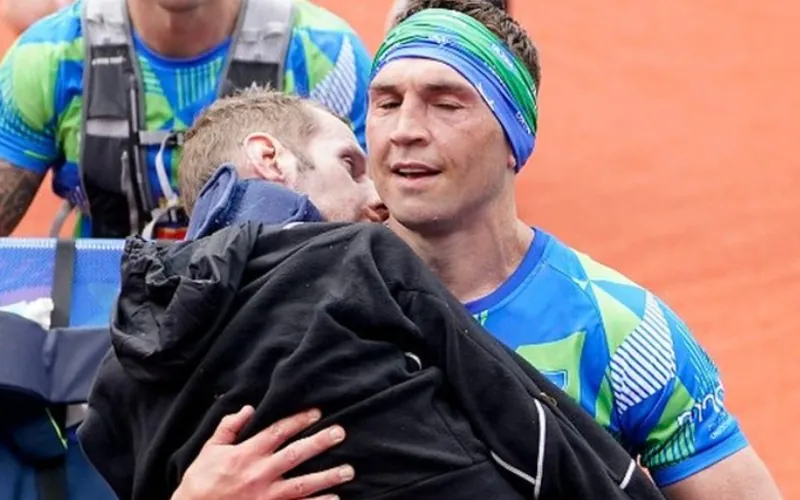
Kevin Sinfield carries Rob Burrow over the finishing line at the 2022 Rob Burrow Leeds Marathon
Sinfield recalled: “That particular day it got to about 22C and Rob’s all wrapped up. Because of where Rob was at this stage, we had to keep getting out of the chair and stretching, and he was shaking and dehydrated, and it was tough. It was difficult, and we communicated through smiles.
“We had to keep stopping, and we were really worried about him. But the funny story is how competitive he was, because we got there and there was another wheelchair, another guy with MND who joined.
“Every time we stopped with Rob, the other chair would come past us, and they had a group of eight pushing. It’s me pushing, and I’m quite competitive, but Rob’s more competitive than I am.
“Every time we got him back in the chair, we’d catch them up, go past them. But we got about 7k from home and they passed us again, but we are stopping every 2 or 3k at this point.
“Anyway, I leaned down to him and said, ‘are you going to come second at your own marathon?’ and he just gave us the biggest smile.
“I know rugby has given me a platform and it means I’m front and centre of it but we’ve got a fantastic team. And you know, you can’t be great without the greatness of others, and our team’s a brilliant team.
“For me, having retired from playing, this has been huge. It’s been massively fulfilling. I feel I’ve got far more back than I’ve given.”
To find out how you can donate to Kevin Sinfield’s latest fundraiser – 7 in 7 Together – click here

